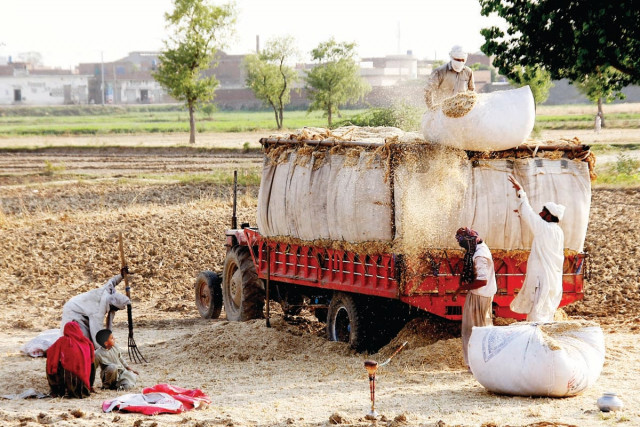The wheat market jigsaw puzzle
PASSCO makes profits at the expense of farmer prosperity.

In May 2013, Passco drove a campaign to buy wheat at official market prices and deprived both farmers and traders of their right to sell and hold surplus quantity in the hope of making more money in future. PHOTO: ABID NAWAZ/EXPRESS/FILE
Consider these three news items as part of a jigsaw puzzle.
May 24, 2013. Pakistan Agriculture Storage and Services Corporation (Passco) Managing Director Major General Tauqeer Ahmed has cautioned in a statement that those growers who will hold wheat with them to fetch high prices in future may have an equal risk of bearing losses.
He warned farmers that wheat prices may fall after the government achieves its procurement target.
August 3, 2013. Passco has posted a net profit of Rs421.312 million in the financial year ended June 30, 2013 because of sale of wheat crop purchased from farmers, which is described as the best performance in the past five years.

August 2, 2013. Pakistan is set to become a net wheat importer this year with purchases climbing to the highest in five years after delayed planting and reduced fertiliser use hit domestic output and drove up prices.
Let me make it plain for you. In May 2013, Passco drove a campaign to buy wheat at official market prices and deprived both farmers and traders of their right to sell and hold surplus quantity in the hope of making more money in future.
In August 2013, it announced historical profits on the sale of same wheat crop, in addition to previous stocks, which it had purchased a few months ago from farmers. In other words, Passco made profits at the cost of farmers’ prosperity. With the tax income the government has received, it will now claim to dole out welfare to same individuals whose wealth it has stolen.
In the process, Passco distorted the market in many ways. Not only it intervened through an artificial price, it also disturbed normal market operations. Buy when it is plenty and cheap, sell when it is short and dear. This is the golden rule of trade, which attracts investment in commodities.

With its leveraged capacity created by the state, Passco disrupted this market function. It dissuaded farmers from investing and growing more wheat in future which led to reduced supplies. Result is already out – Pakistan will become a net importer of wheat, scrambling for food security for the world’s sixth most populous nation.
The planners have always defended active presence of state in commodity markets. A key rationale provided is price stabilisation. However, with Passco itself profiteering on the basis of price fluctuation, it has undone its fundamental rationale of price stabilisation.
The second defence of planners for commodity operations is always food security and strategic reserves. Let me turn this argument on its head as well.
When Passco became active, it took away incentives from farmers and traders to invest more in future, because premium profits come by holding, not by instant selling. Premium profits also drive up investments. In this manner, Passco has become a threat to food security, not an asset, by pushing small farmers out of market.
Can Passco be made a low hanging fruit? Nawaz government has yet to announce any bold measures to reform the economy apart from tax increases on the already taxed citizens. While it has made some plans to bring additional investment, it has not taken any solid measures to stop bleeding of economy.
Passco has always remained on the list of entities, which the state can do happily without. However, the new government has conditioned privatisation to profitability of state-owned enterprises. Paradoxically, with high profits made now, Passco has actually qualified for privatisation! It must be dissolved and privatised at the earliest to bring prosperity for small and poor farmers, move towards greater food security and stop taxpayers’ money going to waste.
The writer is Executive Director of Policy Research Institute of Market Economy (PRIME), a free market think tank based in Islamabad
Published in The Express Tribune, August 26th 2013.
Like Business on Facebook, follow @TribuneBiz on Twitter to stay informed and join in the conversation.


















COMMENTS
Comments are moderated and generally will be posted if they are on-topic and not abusive.
For more information, please see our Comments FAQ